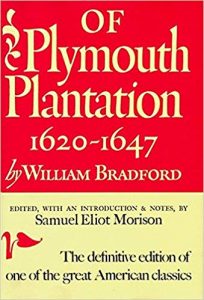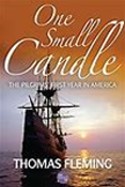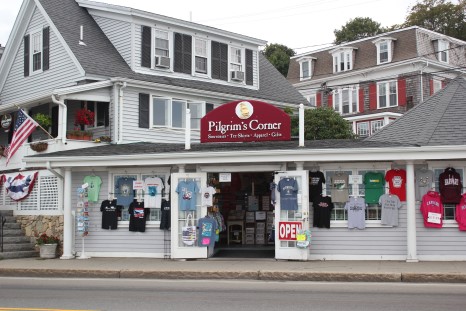
A Mast of the Mayflower Replica, Plymouth Harbor (Taken 2016 by author)
June of 1620 ~ Would the Journey Ever Happen?
It’s June of 2020. What was the group we call the Pilgrims doing 400 years ago? Never mind contemplating the fearsome challenges of an Atlantic crossing and an alien environment. Pilgrim leaders and representatives were trying to overcome a series of serious obstacles on the Dutch and English side of the ocean before they could even set foot on a ship’s deck. Yes, they had been granted what was called the “John Pierce Patent” from the Virginia Company, for a “particular plantation” in the Hudson River area, and the company offered them generous freedoms for running their own affairs. But anxious letters still passed back and forth as a number of important issues were a bit of a mess. It was like climbing the ratlines of the shrouds of a tall-ship mast in stormy seas.
The point? I don’t think we today can begin to appreciate just how amazing it was that this persecuted group of English Separatist village farmers actually managed to arrive in and settle successfully in New England, in the New World, to establish a cornerstone of what would become the world’s greatest and most powerful nation.
Investors, a Necessary “Evil”
The Pilgrims could not venture to the New World on their own. It required money and ongoing support, trade with and supplies from their former home. They needed investors who would gamble their own monies on the hope that the Pilgrim plantation would produce profits worth the adventure. And that’s what they were called ~ the Adventurers, intent on profits from fishing, timber, pelts, and perhaps additional natural resources as well as products ~ anything the Pilgrims could produce. As tobacco became the salvation of Jamestown, it would be the beaver that would fund the greater part of New Plymouth’s needs and debts. Those needs and debts would plague them for years. It would be anything but smooth sailing for both New Plymouth and its Adventurers. It was a lot of risk for both parties.
 Thomas Weston was a London merchant, an ironmonger ~ a trader in hardware and metal utensils. According to Samuel Eliot Morison, Weston was “a man of enterprise, eager to reap quick profits from the new world, and not very scrupulous as to means.” Professor (and Admiral) Morison refers to the writings of Captain John Smith who recorded that a group of about 70 gentlemen, merchants, and tradesmen joined Weston in investing some 7,000 pounds sterling in the Pilgrim plantation enterprise. But Morison writes (note 2, pg. 37, OPP) that the Adventurers sold out to the Pilgrims in 1627 for much less ~ Bradford records that Plymouth settlers would pay 1,800 pounds in annual installments of 200 pounds ~ and so Morison concludes the original investment was much less than 7,000 pounds.
Thomas Weston was a London merchant, an ironmonger ~ a trader in hardware and metal utensils. According to Samuel Eliot Morison, Weston was “a man of enterprise, eager to reap quick profits from the new world, and not very scrupulous as to means.” Professor (and Admiral) Morison refers to the writings of Captain John Smith who recorded that a group of about 70 gentlemen, merchants, and tradesmen joined Weston in investing some 7,000 pounds sterling in the Pilgrim plantation enterprise. But Morison writes (note 2, pg. 37, OPP) that the Adventurers sold out to the Pilgrims in 1627 for much less ~ Bradford records that Plymouth settlers would pay 1,800 pounds in annual installments of 200 pounds ~ and so Morison concludes the original investment was much less than 7,000 pounds.
Funds from Adventurers meant negotiating terms and accepting certain demands. A “joint stock and partnership” arrangement would last for seven years, much like a 7-year indentured servant arrangement, except the investors and the colonists would divide “capital and profits” half and half after seven years, with individuals receiving monies based on their stock (whether bought or earned) in the venture. The settlers wanted their houses left out of the “capital,” to be kept as their own, and they also wanted two days a week to work for themselves, working the other days for the “company.” Weston’s group of investors said “No.” Debate was heated, but the Pilgrims had little choice.
The “Strangers” ~ Another Necessary “Evil”
 The number of Pilgrim church members able and willing to journey to the New World was not large enough to meet the requirements of the Adventurers, so the investors recruited a group of several dozen settlers to join the enterprise. The Pilgrims (and William Bradford) called these people “strangers,” and these additional recruits demanded their own representative named Christopher Martin who began to create problems with both the Adventurers and the Pilgrims regarding the purchasing of supplies. (From Morison’s OPP and Thomas Fleming’s One Small Candle) We’ll see more of the “strangers” as the story progresses.
The number of Pilgrim church members able and willing to journey to the New World was not large enough to meet the requirements of the Adventurers, so the investors recruited a group of several dozen settlers to join the enterprise. The Pilgrims (and William Bradford) called these people “strangers,” and these additional recruits demanded their own representative named Christopher Martin who began to create problems with both the Adventurers and the Pilgrims regarding the purchasing of supplies. (From Morison’s OPP and Thomas Fleming’s One Small Candle) We’ll see more of the “strangers” as the story progresses.
Bradford’s Purpose in Recording the Problems with Preparations
In Chapter VI of his Of Plymouth Plantation, William Bradford reveals his purpose in recording the details, letters, obstacles, debates, etc., of bringing the Pilgrim journey to pass. Having “been the larger in these things,” he apologizes to his readers, “I shall labour to be more contract,” as he continues his story. But his purpose he makes clear,…
that their children may see with what difficulties their fathers wrestled in going through these things in their first beginnings; and how God brought them along, notwithstanding all their weaknesses and infirmities. As also that some use may be made hereof in after times by others in such like weighty employments.
He wrote to teach and inspire the Pilgrims’ future heirs and to help any others who might dare the same type of risks. Since Bradford actually began writing down the first part of his book in 1630, he had a decade of experience and perspective “under his belt,” In a century when people were not as apt to keep journals or write biographies or autobiographies (Shakespeare didn’t), Bradford obviously saw this small colony as a feat worthy of a chronicle, something valuable for those to come. He was correct, and America and history lovers in general are profoundly grateful. His writings are an American treasure and have quite a story of their own, which we will explore soon.
Meanwhile, do you think those original Mayflower passengers and their progeny would be glad to know that their humble Plymouth settlement still exists and prospers in a great and mighty nation? Wouldn’t it be fun and amazing to observe their reaction to the view of anyone landing on Plymouth beach today?

What Pilgrims Would See If They Landed on Plymouth Beach Today

